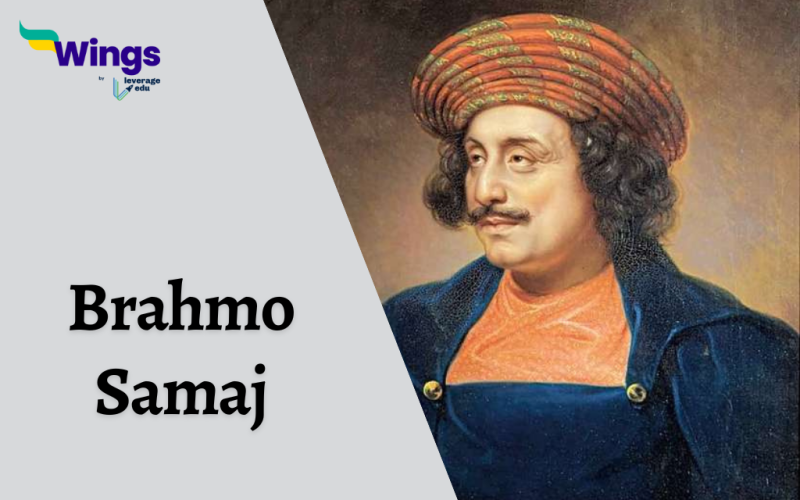Brahmo Samaj meaning the Society of God, was a significant reform movement that emerged during the 19th century in India. Brahmo Samaj was founded by Raja Ram Mohan Roy, an influential social and religious reformer. The Samaj played a great role in politically uplifting the masses through promoting social and religious reforms. This article aims to shed light on the life and contributions of Raja Ram Mohan Roy and the impact of Brahmo Samaj on India’s path to independence.
Table of Contents [show]
What is Brahmo Samaj?
The Brahmo Samaj earlier known as Brahmo Sabha was the first socio-religious organization that aimed to reform Hindu society in colonial India based on modern Western ideas. The organization condemned the caste system, and untouchability and supported the general upliftment and empowerment of women.
Who was the Founder of Brahmo Samaj?
Raja Ram Mohan Roy was the founder of Brahmo Sabha which was a precursor of the Brahma Samaj. Raja Ram Mohan Roy was aptly known as the Father of the Indian Renaissance of Modern India. He established the organization in August 1828 at Calcutta (now Kolkatta) with the objective of eradicating social evils and advocating for rational thinking and moral values.
During the time of social and religious orthodoxy, Roy championed the cause of widow marriage and fought against the practice of Sati. They rejected idol worship, and caste-based discrimination and emphasized the importance of reason and ethical conduct.
Also Read – 20+ Greatest Indian Freedom Fighters and their Sacrifices
What were the Objectives and Features of Brahmo Samaj?
The Brahmo Samaj emphasized monotheism, rejecting idol worship and blind rituals. They focused on the worship of the Supreme Being, promoting the belief that God can be understood through reason and conscience. Their central tenet was the unity of God and the unity of humankind
The main features of Brahmo Samaj are –
- It denounced idol worship and polytheism.
- Discarded faith in divine Avatars or incarnations.
- Denied that any scripture could enjoy the status of ultimate authority.
- Took no stand on the Doctrine of Karma.Left all the Brahmos to believe their ways in the karma system.
- Vehemently criticised the caste system.
Also Read – Widow Remarriage Act: Provisions, History
Famous Personalities Associated with Samaj
There are many people who were associated with Brahmo Samaj, but the two most famous personalities were –
- Debendranath Tagore and
- Keshab Chandra Sen
Debendranath Tagore and Brahmo Samaj
Debendranath Tagore was the father of Rabindranath Tagore and had a Western philosophy even though receiving traditional learning. He was earlier associated with Tattvabodhini Sabha which was founded in 1839. Later in the year 1842, Tagore joined Brahmo Samaj and gave a new shape to its theist movements.
Tagore made a significant contribution by working on two fronts – Promoting women’s education, widow remarriage and outlawing polygamy. Another, he worked within Hinduism and opposed Christian Missionaries for their criticism of Hinduism and conversion attempts.
With him later many prominent free thinkers and leaders who also were followers of Raja Rammohan Roy joined the Samaj, among them were the Derozians, Ashwini Kumar Datta and Ishwar Chandra Vidyasagar.
Also Read – Unveiling the Heroic Role of Women in India’s Freedom Struggle
Keshan Chandra Sen and Brahmo Samaj
Keshab Chandra joined the organization in 1858 and was made the Acharya by Debendranath Tagore. Keshab further popularised the movement and branches of the Samaj outside Bengal. The movement spread to the United Province, Bombay, Punjab and Madras. Sen was accused of being an Authoritarian and his followers considered him an incarnation. Unfortunately, Debendranath Tagore also did not like some of his ideologies and found them too extreme. Thus, in the year 1865, Keshab Chandra Sen was dismissed from the office of Acharya.
Later in the year 1878, the disgusted followers of Keshab found the new organization and gave rise to disunity in the organization that resulted in two divisions –
- Adi Brahmo Samaj – Raja Ram Mohan Roy, Debendranath Tagore and Prasanna Coomar were the founders.
- Sadharan Brahmo Samaj – Ananda Mohan Bose, Umesh Chandra Dutta and Sib Nath Shashtri were in charge of this organization.
What was the Significance of the Brahmo Samaj?
Brahmo Samaj was successful in its social reform. Some of the significance of their movement are –
- They attacked many superstitions and dogmas of the society.
- Condemned the prevailing Hindu prejudices attached to going abroad.
- It worked for the upliftment and the status of respect for women and their education in society.
- Worked for the abolition of the Purdah system and condemned the practice of Sati.
- It also discouraged the prevailing polygamy and child marriage practices.
- Attacked the untouchability and casteism though in a limited manner.
- It proposed the idea of morality and logical intellect.
The principles of the Brahmo Samaj played a crucial role in inspiring the Indian nationalist movement. Prominent leaders like Swami Vivekananda, Rabindranath Tagore, and Mahatma Gandhi were influenced by the Samaj’s philosophy of social harmony and moral values. Their ideas paved the way for India’s struggle for independence.
Relevant Blogs
| Indira Gandhi | Swaraj Party |
| Tribal Movements | Popular Struggles and Movements |
| Peasant Movements | Kiran Bedi |
| Morley-Minto Reforms | Gandhi Irwin Pact (1931) |
| Bengal Partition | Birsa Munda |
We hope you liked our blog. If you want to read more articles like this you can visit our general knowledge page on Indian History!
 One app for all your study abroad needs
One app for all your study abroad needs















 45,000+ students trusted us with their dreams. Take the first step today!
45,000+ students trusted us with their dreams. Take the first step today!
